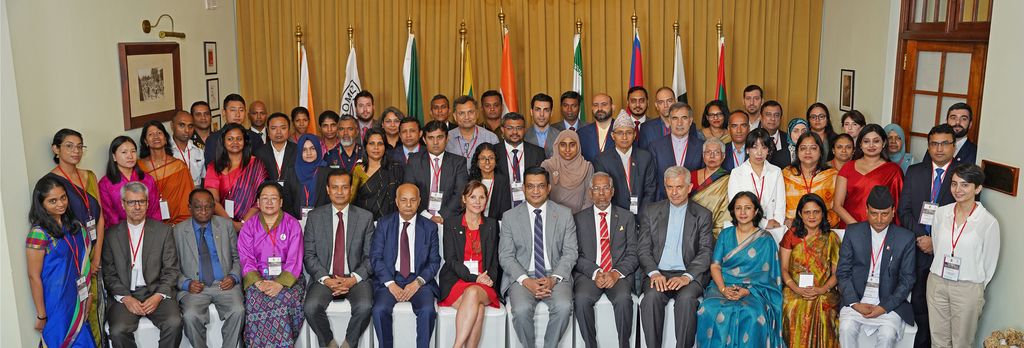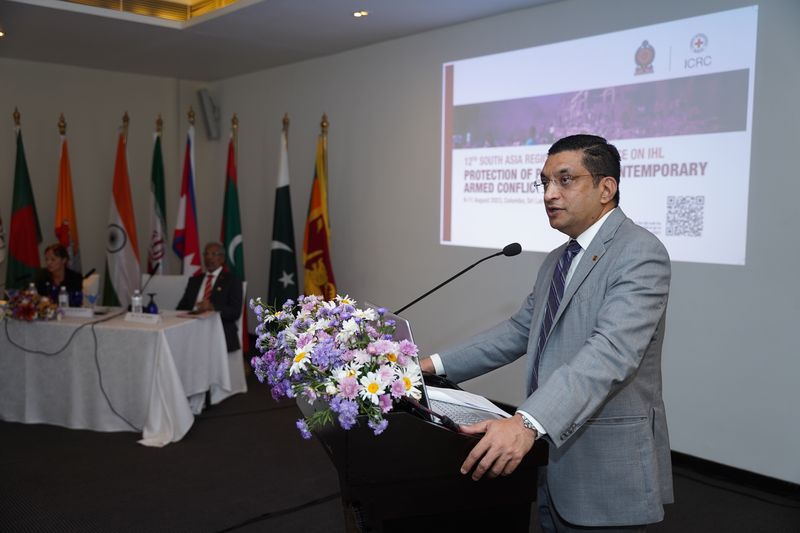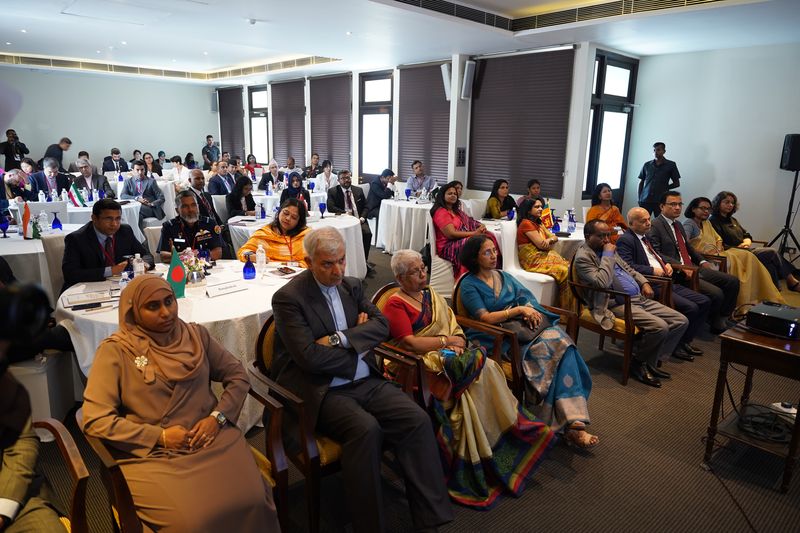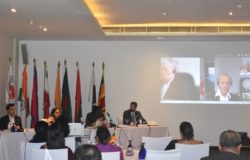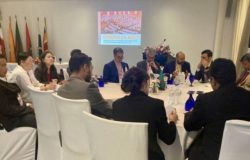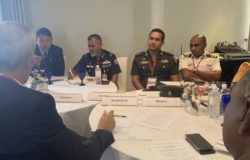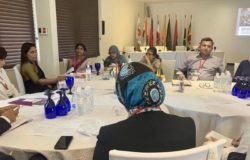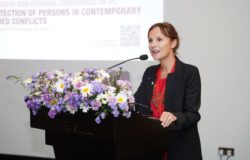9-11 August 2023, in Colombo, the 12th edition of the South Asia Regional Conference on International Humanitarian Law (IHL) gathered senior officials from Bangladesh, Bhutan, India, Iran, Maldives, Nepal, Pakistan, and Sri Lanka to discuss and debate on current and emerging issues of IHL.
Co-hosted by the International Committee of the Red Cross (ICRC) and the Government of Sri Lanka, this year’s edition focused on “Protection of Persons in Contemporary Armed Conflicts: International Humanitarian Law Before, During and After Armed Conflict”.
In his keynote address delivered during the opening ceremony, the Minister of Foreign Affairs of Sri Lanka, Hon. M.U.M. Ali Sabry PC, highlighted the importance of implementing IHL in post-conflict situations for addressing humanitarian issues arising from armed conflict.
Mr. U. L. M. Jauhar, Additional Secretary of the Ministry of Foreign Affairs of Sri Lanka and Ms. Séverine Chappaz, Head of the ICRC Delegation in Sri Lanka, also spoke about the continued relevance of IHL in the contemporary world and the efforts of South Asian states in the domestic implementation of IHL.
The ICRC has been organizing the Regional Conference annually since 2009 in partnership with States. The event was hosted in Sri Lanka for a third time; previous editions have been held in Bangladesh, Bhutan, Iran, the Maldives, Nepal, and Iran.
The program of the Conference included panel discussions with senior government officials, including members of the armed forces and police, and the ICRC experts, as well as group discussions that addressed various thematic issues of IHL in the 21st century. The three-day conference featured panel discussions on various thematic, including urban warfare, human dignity in armed conflict, detention at sea, and disability in armed conflict, among others. An overview of some of the specific discussions is presented below.
Urban warfare: Responding to humanitarian needs in urban settings –panel discussion highlighted the complex consequences of armed conflict for urban populations and the need for a deeper understanding of the complex and accumulated patterns of civilian harm involved. State representatives and experts spoke of the importance of measures to prevent, reduce and respond to the impact of urban warfare, including the role of applicable rules of IHL.
Upholding human dignity in armed conflict – The panel discussion addressed sexual violence prevalent in contemporary armed conflicts. Capitalizing on the absolute prohibition under IHL and human rights law of all forms of sexual violence, the speakers shared experiences and practices to improve the implementation of existing laws at the domestic and international levels.
Detention at sea: obligations, rights, challenges, and best practices – State and ICRC experts discussed the phenomenon of detention at sea in the context of an armed conflict – that is, taking on board of naval vessels, the wounded, sick and shipwrecked for limited periods. Speakers unpacked relevant rules of IHL, as well as humanitarian risks and the importance of planning for such situations.
Disability in armed conflict: increasing visibility of persons with disabilities in armed conflict – The panel discussion highlighted that armed conflict creates new barriers for persons with disabilities and amplifies those barriers and inequities already existing within a society, leading to a heightened risk of harm and death. State representatives and experts also discussed contemporary interpretation of IHL, as well as the complementarity between IHL and the Convention on the Rights of Persons with Disabilities, in particular its Article 11. The ICRC expert also spoke about the organization’s Vision 2030 to be a provider of and advocate for inclusive humanitarian services.
Looking for answers by accounting for the separated, missing, and dead in armed conflicts – The panel discussed how armed conflicts affecting all regions of the world today continue to result in the separation of families and in people going missing and dying. The speakers unpacked relevant rules of IHL that seek to account for people in the hands of the enemy, to prevent family separation and people from going missing, and to ensure that the dead are treated with dignity and properly identified in war. They also addressed rules on the ICRC’s Central Tracing Agency and the National Information Bureaus (NIBs), and the importance of giving effect to them in legislation and practice well before a war starts if they are to fulfil their promise.
IHL and the digital domain: A new era for the distinctive emblems? – Panel discussion addressed a real risk of harm to civilians associated with the use of cyber operations as means or methods or warfare in armed conflicts. Building on the discussions at other relevant fora, including the 2022 Asia-Pacific Regional Consultation, speakers unpacked the applicability of IHL to cyber operations during armed conflict and how it protects civilians, civilian infrastructure, and civilian data against cyber harm. The session also presented an innovative initiative to explore the feasibility of digitalizing the Red Cross, Red Crescent, and Red Cristal emblems to signal the protection of medical and humanitarian services from digital harm during armed conflict.
Table Talks: Bringing IHL Home – Working groups composed of civilian and military authorities from represented States spoke of legal, administrative, and practical measures they have taken to give effect to IHL rules at the domestic level. Table-talks were framed around Resolution 1 (33IC/19/R1) of the 33rd International Conference of the Red Cross and Red Crescent entitled Bringing IHL Home: A road map for better national implementation of international humanitarian law. Delegations shared their experiences, such as the creation of national IHL committees, progress made in the ratification and implementation of IHL treaties, and preparation of compatibility studies and voluntary reports.
Moving forward: Towards the 34th International Conference of the Red Cross and Red Crescent – Participants of the Regional Conference discussed the upcoming International Conference entitled “Navigate Uncertainty – Strengthen Humanity” which will bring together States and components of the Red Cross and Red Crescent Movement in 2024. Coinciding with the 75th anniversary of the Geneva Conventions of 1949, IHL will be one of the main pillars of the Conference. Representatives of the Regional IHL Conference spoke of the importance of reaffirming the commitment to and respect for IHL and agreed to share their experiences and best practices at the International Conference.
At the closing of the event, the delegations represented at the 2023 edition of South Asia Conference on IHL reaffirmed the significance of this regional forum for peer-to-peer exchange, debate, and consolidation of South Asian States’ perspective on current and emerging issues of IHL.
Photo Gallery:


